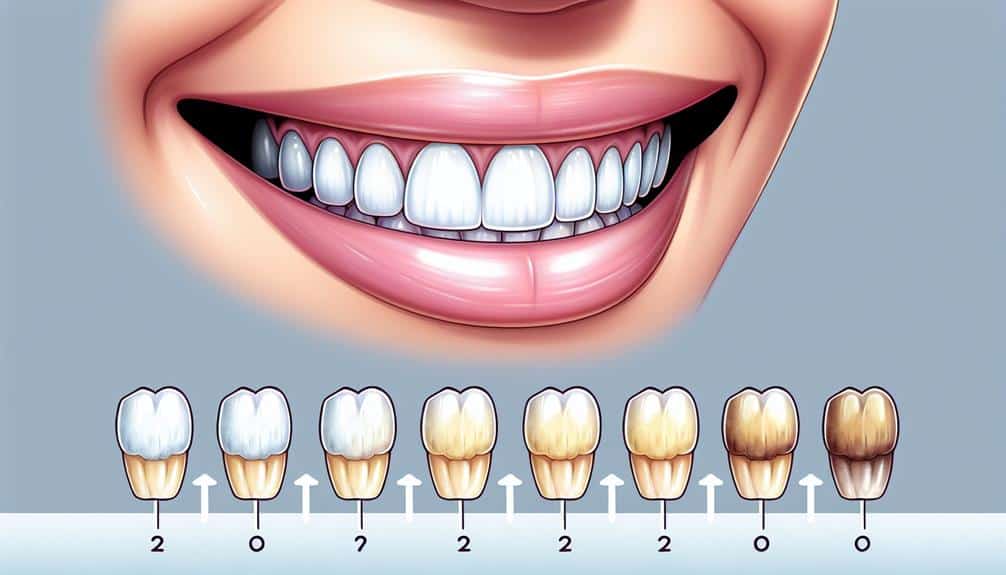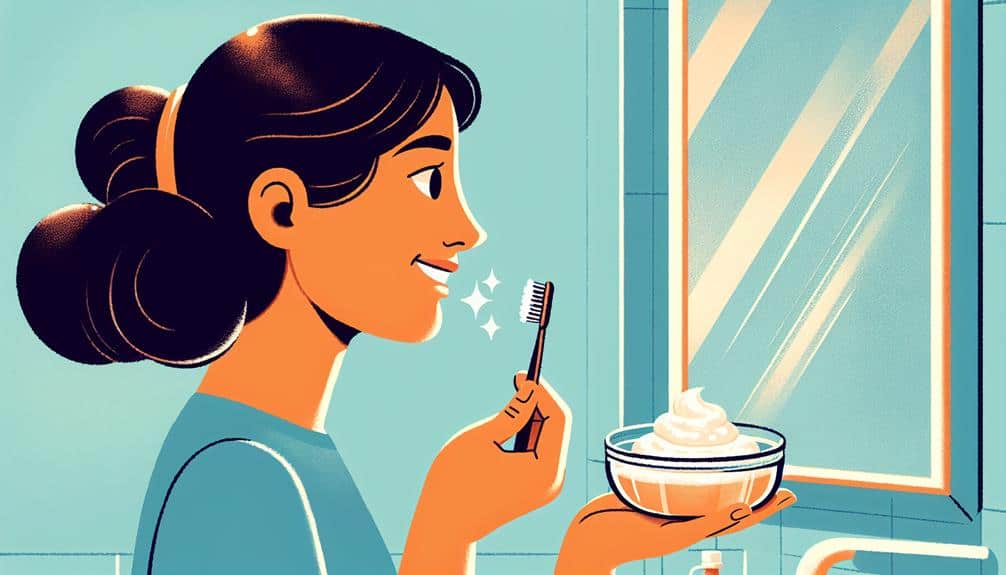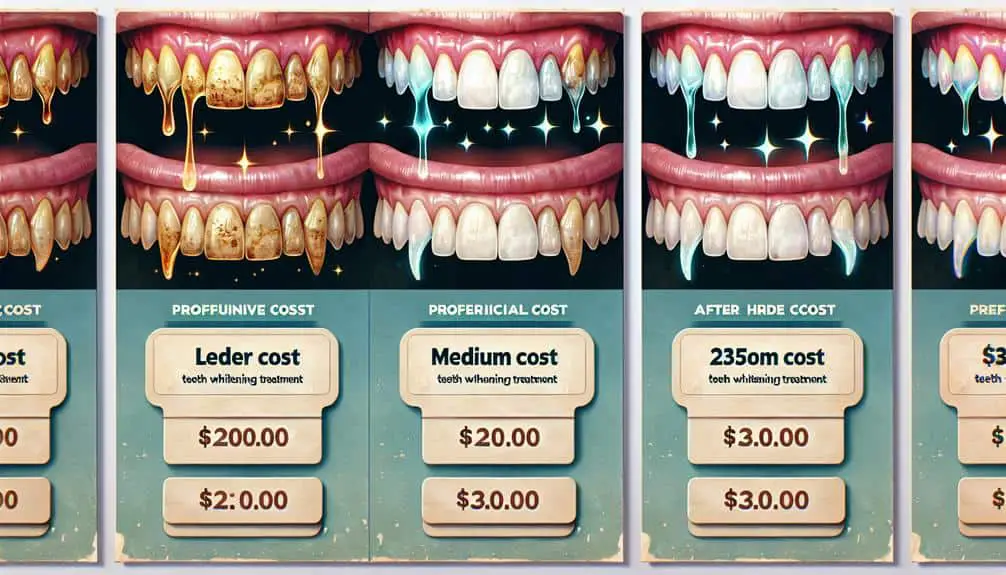Over time, your teeth whitening results fade due to factors like genetics affecting enamel thickness, as well as the impact of your diet and lifestyle choices, such as consuming staining foods and beverages and habits like smoking. Maintaining proper oral hygiene practices, monitoring what you eat and drink, and being mindful of lifestyle habits can help prolong the longevity of your whitening results. Understanding these influences can assist you in preserving your bright smile for longer.
Key Points
- Genetics play a significant role in how long teeth stay white.
- Enamel thickness affects resistance to staining agents.
- Diet, particularly staining foods and drinks, can fade whitening results.
- Proper oral hygiene habits are crucial for maintaining whitening effects.
- Lifestyle choices, like smoking and certain foods, contribute to teeth staining.
Factors Affecting Whitening Longevity
To maintain the longevity of your teeth whitening results, it's essential to understand the key factors that can impact the fading process. Genetics play a significant role in how long your teeth stay white. Some individuals naturally have teeth that are more resistant to staining, while others may find that their teeth tend to yellow or discolor more quickly.
Enamel thickness is another important factor to take into account. Thicker enamel tends to be more resilient against staining agents, helping to preserve the whiteness of your teeth for a longer period.
Enamel thickness varies among individuals due to genetic factors. Those with thinner enamel may notice that their teeth whiteness fades faster compared to those with thicker enamel. Understanding your enamel thickness can help you tailor your oral care routine to better maintain your teeth whitening results.
The Role of Diet in Maintenance
Maintaining the longevity of your teeth whitening results can also be influenced by the foods and beverages you consume on a regular basis. Your diet plays an important role in how long your teeth stay white after a whitening treatment. Here are some key points to keep in mind:
- Dietary Restrictions: Certain foods and drinks, such as coffee, tea, red wine, and dark-colored berries, can stain your teeth and contribute to the fading of whitening results. Limiting consumption of these items can help maintain the brightness of your smile.
- Whitening Touch Ups: Incorporating whitening touch-ups into your dental care routine can help combat the effects of staining foods and beverages. These touch-up treatments can be done at home or at the dentist's office to refresh your smile and keep it looking vibrant.
- Nutrient-Rich Foods: Eating a balanced diet rich in fruits and vegetables not only contributes to overall oral health but can also support the longevity of your teeth whitening results. Nutrient-rich foods help strengthen enamel and protect against staining, aiding in the preservation of your bright smile.
Importance of Oral Hygiene Habits
Maintaining proper oral hygiene habits is essential for preserving the longevity of your teeth whitening results. Brushing techniques play a pivotal role in preventing the buildup of stains and plaque on your teeth. It's important to brush at least twice a day using a fluoride toothpaste and a soft-bristled brush. Utilize gentle circular motions to clean all surfaces of your teeth effectively. Pay close attention to areas where stains commonly accumulate, such as along the gumline and between teeth.
In addition to brushing, incorporating flossing into your daily routine offers significant benefits for maintaining your teeth whitening results. Flossing helps remove plaque and food particles from areas that your toothbrush may not reach, promoting overall oral health and preventing discoloration. Make sure to floss at least once a day, gently guiding the floss between each tooth and along the gumline.
Impact of Lifestyle Choices
Maintaining your teeth whitening results depends heavily on the influence of lifestyle choices you make daily. Certain habits can impact the longevity of your whitening effects a great deal. Here are some key factors to take into account:
- Smoking Habits and Staining Sources:
Smoking not only harms your overall health but also greatly contributes to teeth staining. The tar and nicotine in cigarettes can discolor your teeth, leading to a faster fading of whitening results.
- Coffee Consumption:
While coffee is a beloved morning ritual for many, its high tannin content can cause enamel erosion over time. This erosion can make your teeth more susceptible to staining, ultimately diminishing the effects of your whitening treatment.
- Dietary Choices:
Foods high in pigments like berries, tomato sauce, and soy sauce can also stain teeth. Being mindful of your dietary choices and practicing moderation with these staining foods can help prolong your teeth whitening results.
Tips for Prolonging Whitening Results
To prolong the results of your teeth whitening treatment, implementing proper oral hygiene practices is essential. After undergoing a whitening procedure, maintaining good oral hygiene habits can greatly help in preserving your brighter smile. Brush your teeth at least twice a day with a whitening toothpaste to remove surface stains and prevent new ones from forming. Floss daily to eliminate plaque and debris between your teeth that could lead to discoloration. Additionally, using a whitening mouthwash can help maintain the whiteness of your teeth by reaching areas that brushing and flossing may miss.
Regular dental check-ups are vital for ensuring your whitening results last longer. Your dentist can provide professional cleanings and offer advice on proper oral care tailored to your needs. Moreover, consider whitening touch-ups periodically to combat any staining that may occur over time. Stain prevention is key, so avoid or limit consumption of foods and beverages that are known to discolor teeth, such as coffee, tea, and red wine. By following these tips diligently, you can extend the effects of your teeth whitening treatment and enjoy a brighter smile for an extended period.
Frequently Asked Questions
Can Teeth Whitening Cause Damage to Enamel Over Time?
Teeth whitening can gradually wear down enamel if not properly maintained. To safeguard enamel, make sure you follow whitening maintenance guidelines, use enamel-protecting products, and consult your dentist regularly. Prioritize enamel protection for long-lasting whitening results.
Are There Any Natural Remedies That Can Help Maintain Whitening Results?
To maintain whitening results naturally, focus on diet habits & prevention. Incorporate lifestyle changes & oral care. Consistent brushing, flossing, and using whitening toothpaste can help. Limit staining foods & drinks for lasting results.
How Often Should I Touch up My Teeth Whitening Treatment?
To maintain your teeth whitening results, touch up every 6-12 months. Brush with whitening toothpaste, avoid staining foods like coffee, and use a straw for drinks. Regular dental cleanings help preserve your bright smile.
Does Smoking Have a Significant Impact on the Fading of Whitening Results?
Smoking greatly affects the longevity of whitening results. Your dietary habits and lifestyle choices, like smoking, impact the maintenance of a bright smile. Consistent oral hygiene and regular touch-ups help combat the fading effects caused by such habits.
Can Certain Medications Affect the Longevity of Teeth Whitening Results?
Certain medications can impact the longevity of teeth whitening results. Factors such as dietary habits, lifestyle choices, genetics, and aging play a role. It's essential to consult with your dentist to understand how medications may affect your whitening outcome.



